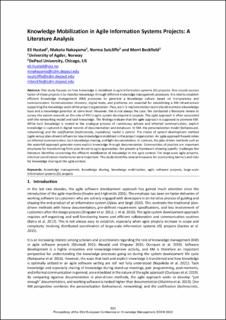| dc.contributor.author | Hustad, Eli | |
| dc.contributor.author | Nakayama, Makoto | |
| dc.contributor.author | Sutcliffe, Norma | |
| dc.contributor.author | Beckfield, Merri | |
| dc.date.accessioned | 2023-02-23T13:12:40Z | |
| dc.date.available | 2023-02-23T13:12:40Z | |
| dc.date.created | 2023-02-01T13:33:43Z | |
| dc.date.issued | 2022 | |
| dc.identifier.citation | Hustad, E., Nakayama, M., Sutcliffe, N. & Beckfield, M. (2022). Knowledge Mobilization in Agile Information Systems Projects: A Literature Analysis.Proceedings of the European Conference on Knowledge Management. | en_US |
| dc.identifier.isbn | 978-1-914587-45-0 | |
| dc.identifier.issn | 2048-8963 | |
| dc.identifier.uri | https://hdl.handle.net/11250/3053635 | |
| dc.description.abstract | This study focuses on how knowledge is mobilized in agile information systems (IS) projects. One crucial success factor of those projects is to mobilize knowledge through different knowledge management processes. It is vital to establish efficient knowledge management (KM) processes to generate a knowledge culture based on transparency and communication. Communication channels, digital tools, and platforms are essential for establishing a KM infrastructure supporting the knowledge work of the project organization. Thus, each IS implementation team should maintain a knowledge base and a knowledge potential at some level. However, this is not always the case. We conducted a literature review to survey the extant research on the role of KM in agile system development projects. The agile approach is often associated with the networking model and tacit knowledge. The findings indicate that the agile approach is supposed to promote KM. While tacit knowledge is rooted in the analogue process of continuous actions and informal communication, explicit knowledge is captured in digital records of documentation and databases. In KM, the personalization model (behavioural, networking) and the codification (technocratic, repository) model is central. The choice of system development method (agile versus plan-driven) influences how knowledge is mobilized in the project organization. An agile approach heavily relies on informal communication, tacit knowledge sharing, and light documentation. In contrast, the plan-driven methods such as the waterfall approach generate more explicit knowledge through documentation. Communities of practice are important structures for transforming from plan-driven to agile approaches. We present a framework showing specific challenges the literature identifies concerning the efficient mobilization of knowledge in the agile context. For large-scale agile projects, informal coordination mechanisms were important. This study identifies several measures for overcoming barriers and risks for knowledge sharing in the agile context. | en_US |
| dc.description.abstract | Knowledge Mobilization in Agile Information Systems Projects: A Literature Analysis | en_US |
| dc.language.iso | eng | en_US |
| dc.publisher | Academic Conferences & Publishing International | en_US |
| dc.relation.ispartof | Proceedings of the 23rd European Conference on Knowledge Management, Vol. 23 No. 1 (2022) | |
| dc.relation.ispartofseries | Proceedings of the European Conference on Knowledge Management;1 | |
| dc.rights | Attribution-NonCommercial-NoDerivatives 4.0 Internasjonal | * |
| dc.rights.uri | http://creativecommons.org/licenses/by-nc-nd/4.0/deed.no | * |
| dc.title | Knowledge Mobilization in Agile Information Systems Projects: A Literature Analysis | en_US |
| dc.title.alternative | Knowledge Mobilization in Agile Information Systems Projects: A Literature Analysis | en_US |
| dc.type | Chapter | en_US |
| dc.type | Conference object | en_US |
| dc.description.version | publishedVersion | en_US |
| dc.rights.holder | © 2022 The Author(s) | en_US |
| dc.subject.nsi | VDP::Samfunnsvitenskap: 200 | en_US |
| dc.subject.nsi | VDP::Teknologi: 500::Informasjons- og kommunikasjonsteknologi: 550 | en_US |
| dc.source.pagenumber | 533-541 | en_US |
| dc.source.volume | 23 | en_US |
| dc.identifier.doi | https://doi.org/10.34190/eckm.23.1.561 | |
| dc.identifier.cristin | 2121791 | |
| cristin.qualitycode | 1 | |

